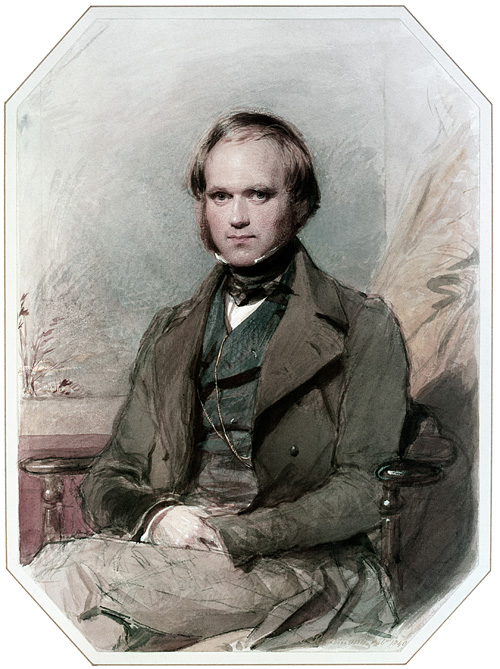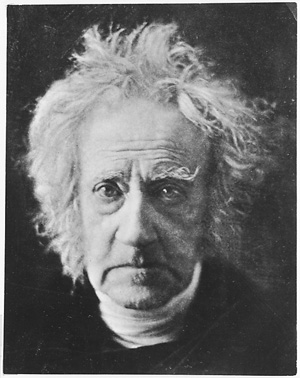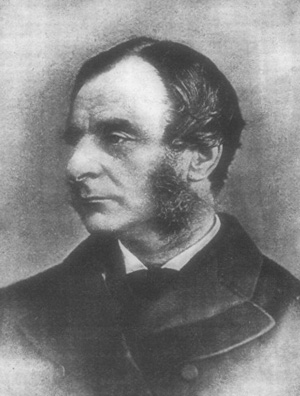
Your complimentary articles
You’ve read one of your four complimentary articles for this month.
You can read four articles free per month. To have complete access to the thousands of philosophy articles on this site, please
Articles
“That Mystery of Mysteries”
Toni Vogel Carey on a forgotten solution to the question of the origin of new species.
In 1836 the English astronomer and polymath scientist John Herschel wrote to Charles Lyell, praising his Principles of Geology, and his courage in addressing “that mystery of mysteries, the replacement of extinct species by others.” Herschel then went on to assert:
“The creator … operates through a series of intermediate causes, and … in consequence the origination of fresh species, could it ever come under our cognizance, would be found to be a natural in contradistinction to a miraculous process.”
This part of Herschel’s groundbreaking letter was made public, and it brought a sigh of relief to the English scientific community. As Lyell wrote to William Whewell, an important figure in the English scientific world:
“You remember what Herschel said in his letter to me. If I had stated as plainly as he has done the possibility of the introduction or origination of fresh species being a natural, in contradistinction to a miraculous process, I should have raised a host of prejudices against me, which are unfortunately opposed at every step to any philosopher who attempts to address the public on these mysterious subjects.”
Life, Letters and Journals of Charles Lyell, 2:5
Herschel went even further in part of the letter that did not become public, describing Biblical miracles as “subjective experiences,” and suggesting that each day of creation would take “thousands of millions of years.” (Cannon 1961a, p.302).
Herschel’s letter carried a great deal of weight because he was then the most famous and respected scientist in England. There was the Herschel name; his father William had discovered the planet Uranus. But the son was revered in his own right, and for thirty or forty years, to be ‘scientific’ meant to be “as much like John Herschel as possible.” (Cannon 1961, p.215) His brilliance and command of the whole panoply of science were apparent to all; and he had a wonderful way with words. Here is a passage from section 9 of his Preliminary Discourse on the Study of Natural Philosophy (1830), which captivated experts and novices alike:
“To blow a large, regular, and durable soap-bubble may become the serious and praiseworthy endeavour of a sage, while children stand round and scoff, or children of a larger growth hold up their hands in astonishment at such waste of time and trouble. To the natural philosopher there is no natural object unimportant or trifling. From the least of nature’s works he may learn the greatest lessons. The fall of an apple to the ground may raise his thoughts to the laws which govern the revolutions of the planets in their orbits.”
The upshot was that what would cause a firestorm coming from anyone else somehow sounded entirely reasonable coming from Herschel.

A young Charles Darwin: portrait by George Richmond (1840)
John Herschel and Charles Darwin
Darwin read Herschel’s Preliminary Discourse as a Cambridge undergraduate, and as he wrote in his Autobiography, it instilled in him “a burning zeal to add even the most humble contribution to the noble structure of Natural Science.” Almost thirty years later, Darwin says in the first paragraph of the Origin of Species that he hopes to “throw some light on… that mystery of mysteries, as it has been called by one of our greatest philosophers.”
So the first thing Darwin wanted to know when the Origin came out was what Herschel thought of it. He asked his friend Lyell to find out, for Herschel “will not write, and I should excessively like to hear whether I produce any effect on such a mind” (Correspondence of Charles Darwin, 7:392). As he soon learned, the Origin did produce an effect on Herschel; but not the desired effect. Darwin wrote a month later to Lyell (ibid. 423): “I have heard by round about channel that Herschel says my Book is the law of higgledy-pigglety. What this exactly means I do not know, but it is evidently very contemptuous. If true this is great blow & discouragement.”
Why would Herschel deny to Darwin what he had granted to Lyell years before? The sticking point was homo sapiens, where Herschel would not allow any role for chance variation. As the Darwin scholar David Hull explains in Darwin and his Critics (p.61), Herschel “did not want to deny that evolution might occur by law, but it had to be a law worthy of God.” For Herschel – and for Lyell too, as Janet Browne points out in her Darwin biography Voyaging (p.362), “God stood rampant between man and apes.”
Darwin had little patience with this exaltation of homo sapiens. “It is absurd to talk of one animal being higher than another,” he writes in a notebook. “Who with the face of the earth covered with the most beautiful savannahs & forests dare to say that intellectuality is [the] only aim in this world[?]” (ibid. p.373). Darwin had a healthy respect for plants too, noting in his Autobiography, “It has always pleased me to exalt plants in the scale of organized beings.”

John Herschel after reading The Origin of Species
In short, with or without Herschel’s blessing, Darwin was confident of the soundness of his theory. He wrote to Asa Gray in 1859:
“I fully admit that there are very many difficulties not satisfactorily explained by my theory of descent with modification, but I cannot possibly believe that a false theory would explain so many classes of facts as I think it certainly does explain. On these grounds I drop my anchor, and believe that the difficulties will slowly disappear.”
(Correspondence of Charles Darwin 7: 369)
As for “the view that each variation has been providentially arranged,” he commented that this “seems … to make Natural Selection entirely superfluous, and indeed takes the whole case of the appearance of new species out of the range of science.” (More Letters of Charles Darwin, p.191).
Nevertheless, he struggled with the God issue, and wrote to Asa Gray in 1860:
“I had no intention to write atheistically. But I own that I cannot see as plainly as others do, and as I should wish to do, evidence of design and beneficence on all sides of us. There seems to me too much misery in the world. I cannot persuade myself that a beneficent and omnipotent God would have designedly created the Ichneumonidae [a kind of wasp] with the express intention of their feeding within the living bodies of Caterpillars, or that a cat should play with a mouse. Not believing this, I see no necessity in the belief that the eye was expressly designed. On the other hand, I cannot … be contented to view this wonderful universe [as] the result of brute force. I am inclined to look at everything as resulting from designed laws, with the details, whether good or bad, left to the working out of what we may call chance. Not that this notion at all satisfies me. I feel most deeply that the whole subject is too profound for the human intellect. A dog might as well speculate on the mind of Newton.”
(Life and Letters 2:105)
Charles Darwin and Charles Kingsley
London’s Great Exhibition of 1851, which some called the last and greatest wonder of the world, showed off the latest advances in science and technology. There was some disagreement whether it was a threat or a monument to Christianity; but either way, the implication was that science should be a handmaiden of religion.
The big theological issue of the time was General vs. Special Providence, which is something like deism vs. theism. Deism, which is said to date in England from Lord Herbert of Cherbury in 1624, is the position that God created the original state of nature, which then developed in accordance with natural laws, themselves directly or indirectly set in place by God. By contrast, Special Providence or Special Creation is the position that God intervenes directly in the lives of individuals, and so may breach the natural order of things He himself created. This topic is complicated, and we need not get bogged down in it. I just want to talk about a simple win-win compromise formula put forward in the third quarter of the nineteenth century – win-win because it pleased both English clerics and Darwin.

Charles Kingley
The hero of my tale is Charles Kingsley (1819-1875), who had a remarkable career as Canon of Chester Cathedral and later of Westminster Abbey, and also as Regius Professor of Modern History at Cambridge, and he was the celebrated author of children’s books like the historical novel Westward Ho! As a friend of Darwin’s, Kingsley received a review copy of the Origin, which he was among the first to praise. And we know what he said, because Darwin quoted from his letter in the second edition of the Origin:
“A celebrated author and divine has written to me that he has ‘gradually learnt to see that it is just as noble a conception of the Deity to believe that He created a few original forms capable of self-development into other and needful forms, as to believe that he required a fresh act of creation to supply the voids caused by the action of His laws’.”
This comment appears in the final section of the Origin, just a few pages before the famous last sentence, where we find the only mention in this work of any form of the term ‘evolution’:
“There is grandeur in this view of life, with its several powers, having been originally breathed by the Creator into a few forms or into one; and that, whilst this planet has gone cycling on according to the fixed law of gravity, from so simple a beginning endless forms most beautiful and most wonderful have been, and are being evolved.”
In 1874, Kingsley presented a nicer statement of his win-win formula in the preface to his Westminster Sermons: “We knew of old that God was so wise that He could make all things; but behold, He is so much wiser than even that, that He can make all things make themselves.” And fellow clerics like the Archbishop of Canterbury condoned this idea. Whether it was really Darwin’s view is another question. But he was content to acquiesce in it, not only for the sake of his devout wife Emma, but because whatever the ultimate origin of things, this left questions of nature squarely in the hands of the scientists.
Thomas Huxley was called ‘Darwin’s bulldog’ for his outspoken defense of the Origin. The Darwin Correspondence (10: 634-5) refers to a letter of 1862 from Kingsley to Huxley, acknowledging Darwin’s influence on his own ‘natural theology’. And some 150 years later, a paper by Piers Hale in the journal Science and Education (2011) calls Kingsley “Darwin’s other bulldog.”
Our Dumb Century
In 2000 Stephen Jay Gould confidently described creationism as just an “American bizarrity.” But whether you call it ‘scientific creationism’ or ‘creation science’ or ‘young-earth creationism’ or ‘intelligent design’, in the 2009 book Galileo Goes to Jail, and Other Myths about Science and Religion Ronald Numbers makes clear that this has become a global phenomenon:
• In Great Britain, few besides evangelicals paid attention to creationism before 2002. But by 2006 a BBC poll showed that 4 out of 10 in the UK thought religious alternatives to Darwin’s theory should be taught as science in schools. Only 48% were for the theory of evolution; 39% were for creationism or intelligent design, and 13% were undecided.
• On the Continent too, 40% said they believed in naturalistic evolution and 41% favored ‘theistic evolution’ or recent special creation; 19% were undecided.
• With the collapse of the Soviet Union in 1989, creationist missionaries began founding new societies in Poland, Hungary, Romania, Serbia, Russia and the Ukraine. In 2006 Poland’s minister of education repudiated the theory of evolution, and his deputy dismissed it as “a lie.”
• In Brazil, by 2004 “the overwhelming majority favored teaching creationism.” And in a strange twist, the aggressiveness of the Protestants there confused and confounded the Catholic majority.
• From the mid-1980s in Turkey, the minister of education wanted to replace evolution-only with a model of teaching both evolution and creation “fairly.” And all public school science teachers there received complimentary copies of Scientific Creationism.
• Not all orthodox Jews accept the idea of evolution, and in 2000 Jewish antievolutionists in Israel and the United States formed the Torah Science Foundation, under the influence of Rabbi Schneerson, who denied that evolution has “a shred of evidence to support it.”
• In Asia, despite very stiff competition Korea has managed to emerge as “the creationist powerhouse.”

Did creation create itself?
The British magazine New Scientist was right on the money, it seems, with its 2000 cover story: ‘Start Worrying Now’, because “From Kansas to Korea, Creationism is Flooding the Earth.”
Now we have an uproar of a different stripe over Thomas Nagel’s 2012 book Mind & Cosmos: Why the Materialist Neo-Darwinian Conception of Nature is Almost Certainly False. This comes as a punch in the stomach to the mainstream academic world, because Nagel, the author of famous essays like ‘What Is It Like To Be a Bat?’ and books like The View from Nowhere, is a superstar philosopher and intellectual.
In Mind & Cosmos, Nagel takes aim at the ‘orthodox’ reductionist view that biology is “in principle completely explained by physics and chemistry,” and psychology, in turn, by biological “mechanisms” (19, 66). In place of “chance, creationism, and directionless physical law” (91), as he describes the available alternatives, Nagel argues for ‘natural teleology’, a view of nature as forward-looking and purposeful, yet secular rather than deistic or theistic. Natural teleology is not exactly a new idea, of course; it goes back to Aristotle, as Nagel acknowledges very briefly (66). But it goes against the orthodox received view in evolutionary biology that natural selection is blind to the future, and progressive only ‘locally’, in terms of better adaptation of an organism to its immediate ecological environment. As Darwin puts it in Chapter 4 of the Origin, “Each creature tends to become more and more improved in relation to its conditions” – although to be sure, in the very next sentence he suggests something more sweeping: “This improvement inevitably leads to the gradual advancement of the organization of the greater number of living beings throughout the world.”
It hardly matters here, though, what Darwin’s position is, since Nagel mentions him only once in a footnote (6); and that refers to Elliott Sober’s reading of Darwin. And Nagel is just as dismissive of a theory that seems right up his alley, that of ‘self-organization’ associated with Stuart Kauffman and the Santa Fe Institute, which now figures in all the sciences, physical, biological and social. Making matters worse, Nagel gives Michael Behe, the chief advocate of intelligent design on scientific grounds, as much space as Darwin or Kauffman. Perhaps the best judgment of Nagels’ book is that of Michael Ruse, a bona fide Darwin scholar who writes extensively on the evolution-religion controversy, who says simply: “He’s done so little serious homework.” (quoted in Chorost 2013).
Of course, when it comes to a lack of serious homework you can’t beat the global creationist movement, Behe notwithstanding. It’s as if Herschel had never written to Lyell almost 200 years ago, and the author of Westward Ho! had never preached from the pulpit that a God who makes all things make themselves is cleverer than a God who takes it upon himself to create half a million species of beetles.
© Dr Toni Vogel Carey 2014
Toni Vogel Carey, a philosophy professor in a former life, has written for twenty years as an independent scholar about philosophy and the history of ideas, and serves on the US advisory board of Philosophy Now.
References
• Cannon, Walter F. (1961) ‘John Herschel, and the Idea of Science’, Journal of the History of Ideas 22: 215-39.
• Cannon, Walter F. (1961a) ‘The Impact of Uniformitarianism: Two Letters from John Herschel to Charles Lyell, 1836-1837’, Proceedings of the American Philosophical Society 105: 301-14.
• Chorost, Michael (2013) ‘Where Thomas Nagel Went Wrong’, Chronicle of Higher Education (Chronicle Review, 5/13).
• Darwin, Charles [1859] (1991) The Origin of Species By Means of Natural Selection (Prometheus Books).









